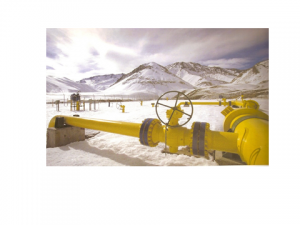The Ukrainian crisis highlights once again the vulnerability of Western and Eastern Europe on energy. Some facts about natural gas are quite revealing (see EIA , www.eia.org ) . If we consider the group consisting of the EU, Switzerland, Norway, Turkey and the Balkan countries which do not belong to the EU, these countries consumed 18.7 Tcf ( Tera cubic feet) of gas in 2013, which is about 450 Mtoe, imports from Russia amounting to 30%; this dependence varies greatly from one European country to another (gas supplies to France are relatively well balanced with 15% from Russia while those in Germany are much less ). Half of this gas is imported through Ukraine (representing 16 % of EU gas consumption) via two major pipelines one being aptly named »  Brotherhood » (the Russians do not lack humor !), the other « Union » ( in Russian Soyuz ). Dependence vis-à-vis the transit in Ukraine was much higher (80% of imports from Russia ) before the commissioning of the Nord Stream gasline in 2011 which bypasses Ukraine by directly connecting Russia to Germany through the Baltic sea (the company that manages the gaspipe is chaired by former German Chancellor G. Schröder ) . A third trans-Balkan gaspipe, South Stream, will supply Turkey and the Balkan countries in a few years bye-passing Ukraine (another one already supplies Poland and Western Europe through Belarus). We must consider that is not only the content of pipes (gas) which is strategic but their path ….. Of course the volumes of imports varies with the seasons, they are twice higher during the winter days than in summer, winter having been relatively mild in Europe this year, imports were lower than usual. Russia has already played with this climate factor in the past to cut gas supplies to Ukraine and to some extent to Poland in winter. As far as Baltic States and Finland are concerned they are totally dependent on Russian for their gas imports.
Brotherhood » (the Russians do not lack humor !), the other « Union » ( in Russian Soyuz ). Dependence vis-à-vis the transit in Ukraine was much higher (80% of imports from Russia ) before the commissioning of the Nord Stream gasline in 2011 which bypasses Ukraine by directly connecting Russia to Germany through the Baltic sea (the company that manages the gaspipe is chaired by former German Chancellor G. Schröder ) . A third trans-Balkan gaspipe, South Stream, will supply Turkey and the Balkan countries in a few years bye-passing Ukraine (another one already supplies Poland and Western Europe through Belarus). We must consider that is not only the content of pipes (gas) which is strategic but their path ….. Of course the volumes of imports varies with the seasons, they are twice higher during the winter days than in summer, winter having been relatively mild in Europe this year, imports were lower than usual. Russia has already played with this climate factor in the past to cut gas supplies to Ukraine and to some extent to Poland in winter. As far as Baltic States and Finland are concerned they are totally dependent on Russian for their gas imports.
One can easily complete this energy dependence picture of Europe. Regarding oil, for example, the EU-27 imported in 2010, nearly 35 % of its oil from Russia, but Europe does not depend so heavily on Russia. Algeria, Nigeria and Qatar are also major suppliers of gas to Europe and of course Norway which does not belong to the EU (see, BP Statistical review of World Energy 2013 www.bp.com ) the overall energy dependence of the EU in 2010 was 55% (it imported 55% of its energy).
Ukrainian crisis only reveals, once more, that the energy dependence of Europe obviously has serious political implications. Russia certainly has no interest to interrupt deliveries of oil or gas to Europe as its oil and gas revenues feed massively its budget, but it is clear that EU has been forced to dose carefully his political responses to the annexation of Crimea (the United States did the same but also for other reasons) due to its energy dependence (Germany and Poland are probably the most vulnerable to a possible gas embargo scenario). Several alternatives have been suggested to reduce this dependence vis -à-vis Russia, in particular the possibility to import shale gas from U.S. This solution is rather amusing in so far as the possibility to exploit shale gas resources in Europe is very often criticized. We just recall that the gas euphoria over the United States is in a global context where it is expected, according to the International Energy Agency (IEA), a growth in global gas demand (cf. IEA, World Energy Outlook 2013, www.iea.org ), driven by Asian countries but also by the prospect of replacing coal with natural gas in thermal power plants. With their gas advantage, the United States plans to significantly expand their gas exports by 2020 (today they only export gas to Mexico and Canada by pipeline, and they have exported small quantities of liquefied natural gas to Japan from Alaska , see P. Papon , » shale gas : myth and Reality » . . , Futuribles , No 399 , p 81 , March-April 2014 , www.futuribles.com ).
The export of shale gas from U.S. to Europe requires significant investments because it requires the construction of LNG terminals (several are under construction, each one representing an investment of about 10 billion dollars). This solution is probably not viable on a large scale for Europe and, in addition, the price of gas (presently very low in the U.S.) would in any way be high because of high transport cost. It is noted that the United States which partially substitute shale gas to coal in their power plants, have increased their coal exports to Europe, especially to Germany ….In a recent speech which he addressed to Europeans in Brussels, President Obama declared “ I think energy is obviously a central focus of our efforts and we have to consider very strongly. This entire event I think has pointed to the need for Europe to look at how it can further diversify its energy sources. And the United States is blessed with some additional energy sources that have been developed in part because of new technologies, and we’ve already licensed, authorized the export of as much natural gas each day as Europe uses each day. …The question is whether through our energy ministers and at the highest levels we’re able to find ways in which we can accelerate this process of diversification, and this is something we’re very much committed to. We think it would be good for Europe. We think it would be good for the United States. It’s not something that can happen overnight, but what I think this entire crisis has pointed to is the need for us to get moving now with a sense of urgency. This means clearly that Europe has to do its own efforts to secure its energy supply.
It is not necessary to dwell longer, as the Ukrainian « crisis » is more a new manifestation of the inability of Europe to define a proactive energy policy. The Suez crisis in 1956 had been a first signal. At that time, France and England had wanted to respond to the nationalization of the Suez Canal by colonel Nasser in Egypt, by occupying the canal, a military operation which had ended in a total political fiasco policy which coupled with a partial blockage of Arabian oil supplies to Europe. Then, continental Europe had tried to respond by focusing on nuclear energy as a means to reduce its energy dependence by creating the Euratom through the Treaty of Rome in 1957, it was not a success … European energy policy has not been since then a success (although the European Coal and Steel Community, the ECSC, created in 1951 was a great success, Europe was still relying on coal at that time … ). We must not forget also that energy has played an important role during the First World War as it was the first » mechanized » war, all belligerents (France, Germany and the United Kingdom) were desperately in need of oil for military operations. Today, Europe wants to be a model of energy sobriety, its policy aiming at drastically limiting its carbon energy consumption (as it has an impact on the climate) is very fine, even if the European CO2 emissions have not a great impact on the global climate change, but Europe should also be concerned about its energy independence, other major countries like the United States (a reason for their interest in shale gas), China and Japan do show a concern about their energy independence and have energy strategies. We have repeatedly raised the issue of the European energy strategy of which we just recall its basic objectives : – common guidelines for hydrocarbon supply policies – strategic reserves – a coherent policy for pipeline construction and interconnection of electricity networks – techniques for the electricity storage – joint expertise of the sectors in particular for renewable energy via R & D – a strong focus on R & D on : energy efficiency, electricity storage and future technologies including nuclear .
Energy transition which is being debated presently in France is a long-term operation that will last probably at least three or four decades. Many events can occur during all these years and Europe would do well to realize that this energy transition will not be a smooth sailing and should be better prepared to secure its energy independence.
